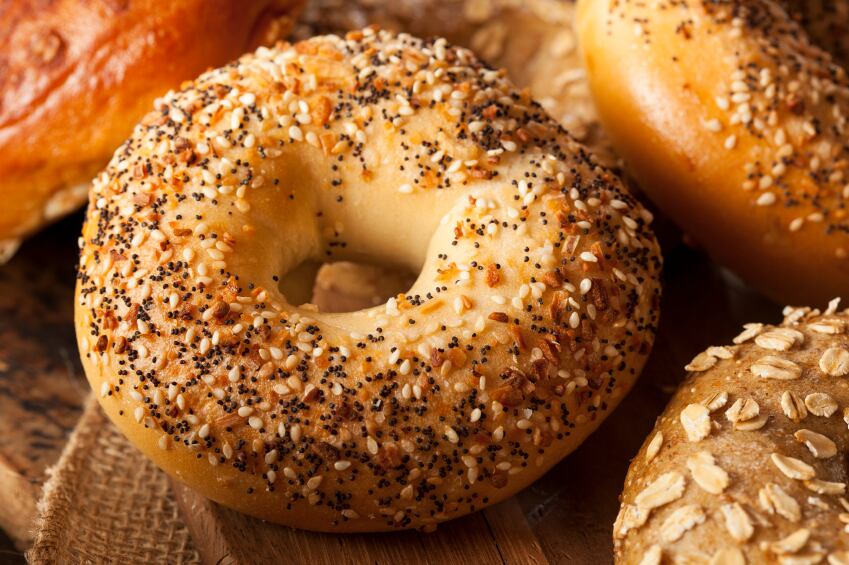Gut microbiome analysis revealed different effects between the two types of bread in two types of bacteria - Coprobacter fastidiosus and Lachnospiraceae bacterium 3_1_46FAA.
Additional findings show that the microbiota composition remained generally stable and person specific throughout the trial.
“Different people react differently, even to the same foods," said Eran Elinav, a researcher at the Department of Immunology at the Weizmann Institute of Science in Rehovot, Israel.
"To date, the nutritional values assigned to food have been based on minimal science, and one-size-fits-all diets have failed miserably.
"These findings could lead to a more rational approach for telling people which foods are a better fit for them, based on their microbiomes," added Elinav, who is also one of the study's senior authors.
Individual responses
Previous research conducted by the same team demonstrates a diverse range of responses to eating a variety of foods.
Further work on murine models highlights genetic differences that can cause certain mice to gain weight on a diet that causes other mice to lose weight.
The popularity of wheat bread suggest that humans and their gut microbiome have adapted to metabolising this food.
However, commonly consumed present-day bread greatly differs from traditional wheat bread in the degree of refinement, type of leavening agent, preparation process, and additives used.

Whole grains contain dietary fibre, B vitamins, iron, magnesium, and zinc and are therefore considered ‘‘healthy,’’ but they are removed in the milling process of refined flour.
The introduction of food preservatives and emulsifiers to commercially made bread may alter the gut microbiome in mice in a manner that induces inflammation and obesity.
In a randomised trial of 20 healthy subjects, participants consumed an increased amount of industrial white bread made from refined wheat for a week - around 25% of their calorie intake.
The remaining participants consumed an increased amount of sourdough-leavened bread made from whole grains using traditional methods. No control group was included in the study design.
The diets for the two groups were reversed after a 2-week period without bread.
Prior to the study and throughout its duration, glucose, calcium, iron, and magnesium levels were monitored as were fat and cholesterol.
Kidney and liver enzymes and several markers for inflammation and tissue damage were also assessed.
The research team also measured the makeup of the participants' microbiomes before, during, and after the study.
"The initial finding, and this was very much contrary to our expectation, was that there were no clinically significant differences between the effects of these two types of bread on any of the parameters that we measured," said Eran Segal, a computational biologist at the Weizmann Institute of Science and one of the study's senior authors.
"We looked at a number of markers, and there was no measurable difference in the effect that this type of dietary intervention had."
However, further investigations based on previous work, which found that different people have different glycaemic responses to the same diet, found that glycaemic response of some of the people in the study were better to one type of bread, and some better to the other type.
The lack of differences, said Segal, were only seen when all findings were averaged together.
“In this study, we found no significant differences on a broad array of clinical parameters between two 1-week-long dietary interventions,” the study stated.
“This was despite statistically significant small changes in the levels of the same parameters following the first week of bread consumption, regardless of its type.
“We further show that the type of bread that induces higher glycaemic responses could be predicted for each subject using only microbiome data.”
Study caveats
The team acknowledged that further research would be required to determine exact mechanisms for the effect of the gut microbiota on glycaemic control.
In addition, Avraham Levy, a professor in the Department of Plant and Environmental Sciences and another co-author, added that the experiments looked at everyone eating the same amounts of carbohydrates from both bread types.
This meant that they ate more whole wheat bread because it contained less available carbohydrates.
“We know that because of its high fibre content, people generally eat less whole wheat bread,” he said.
“We didn't take into consideration how much you would eat based on how full you felt. So the story must go on.”
Others were more critical of the study design and number of participants.
“The more general observation that the responses to food vary by individual is hardly surprising or new,” said Dr Susan Jebb, professor of Diet and Population Health at the University of Oxford.
“The findings are clear – there was no effect of the type of bread on over 20 clinical measurements. It may be that this is too small a group to detect potentially small differences but the fact remains that there was no measureable effect on health.”
Dr Elizabeth Lund an independent consultant in Nutrition and Gastrointestinal Health commented that it was interesting that the bacteria in the gut seemed to predict how individuals may respond to bread consumption.
“This part of the study needs to be checked in larger studies that are explicitly designed to investigate this aspect as it was not the primary aim here.
“It should not be forgotten that the health benefits of whole grains may be much longer-term than a one week study can show, especially in relation to gut health and prevention of conditions like bowel cancer.
“Therefore this study does not imply that people should give up eating whole grain foods based on these results.”
Source: Cell Metabolism
Published online ahead of print: DOI: 10.1016/j.cmet.2017.05.002
“Bread affects clinical parameters and induces gut microbiome-associated personal glycemic responses.”
Authors: Korem et al.
